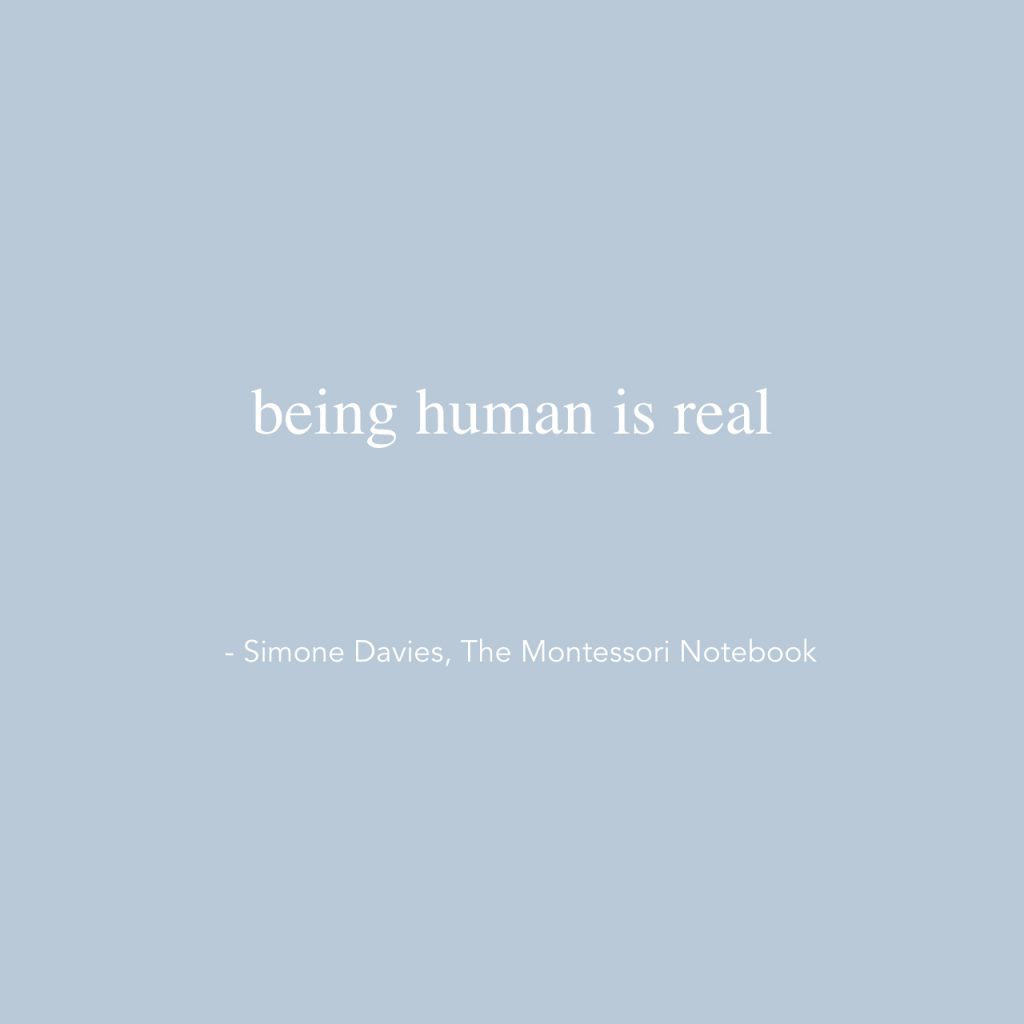6 ways to reduce family stress during the holiday season Montessori-style
Imagine if our dreams of a calm and cosy festive season could possibly be true. We’ve started some family rituals we love, we are starting to work out what we enjoy and what is important to us….
And then along come the extended family with their gifts of plastic toys with flashing lights and no “off” button, so much food and sugar to make our children dance on the ceiling, expectations from every different direction to manage, and a distant relative that has behaviour we’d rather not expose our children to.
How to manage it all???
Here are 6 ways to reduce family stress during the holiday season and come out with beautiful memories for our children in tact.
1. Limit the social calendar
The whole month of December can be filled with commitments from work, school, family and friends. We can say “yes” to it all, but likely by the time Santa is loading his sleigh, our children (and us as well) will be strung out so tightly we could fling the reindeers at record speed around the globe.
Instead, plan some days off in December for pyjama days – days you can go slow and not even get dressed if you want to. These days will act as a buffer for everyone to decompress from the excitement and prevent holiday fun burn-out.
It’s possible to say “no” to invitations without letting people down or lying to them. I like to say “It’s important to me…” to explain why I am declining an invitation, including to not spread myself too thin, to not have too many commitments, or to be present for my family.
Think creatively and perhaps take turns with your partner to attend events, or have a day where people can drop by your place to exchange festive greetings so you can keep the rest of the month simpler.
This is especially important if you have an introverted child who may need to decompress from the socialising – social occasions are often enjoyed by introverted children, but does cost them energy. It can even be an idea to scope out a quiet spot if you have guests or are visiting others, where a sensitive child can sneak away to when they need a bit of quiet time away from the action.
I also suggest managing your family’s expectations. If you have a newborn or a toddler that naps at a particular time of the day, you can give your family a heads-up that that you are looking forward to seeing them but, for example, may need to arrive late after a nap time.
2. Translate for others and ourselves
Communicating clearly during the holiday season can be difficult. There can be different rules at different places you are visiting. There can be different ideas about parenting. And you may have some family who do not understand the Montessori approach – some family members may make you feel like you aren’t helicoptering your child enough, and another may feel like you listen too much to your child.
I often say that sometimes we need to be our child’s translator. At holiday time, we may also need to translate for others or ourselves.
“It sounds like…” is a useful phrase in these situations.
For example:
“It sounds like Grandma is finding the noise in here too much, and you all want to play a chasing game. Can you find a way to do it without being too noisy for Grandma?”
“It sounds like Uncle Steve doesn’t want you to jump on the sofa and you really want to bounce. I wonder what you’ll come up with.”
“It sounds like you really want to play with your cousin’s new toy and they want to play with it all by themselves. Let me know how you solve the problem.”
Also be available to help a child with words if they are having a hard time.
“Did you want to tell them you’d like some quiet time by yourself?”
By translating for our children, others or ourselves, we will be able to help each other hear what the other is trying to say, without threats, the children hitting each other, or too many explosions.
And do not underestimate the creativity of young children, even a pre-verbal child. You may find they search for another toy for the younger relative to play with, they find a way to play chasing on tip-toes, and create a jumping castle out of old pillows in another room.
3. Be clear on your boundaries
Sometimes simply translating may not be enough. Holiday stress is often caused by people crossing our boundaries. It’s usually not even done on purpose, and we may not even aware we had a boundary to be crossed.
So this will take some practice in self-awareness and communication.
If something is too much for you, it is ok to say:
“It’s not okay for you to talk to me that way/ask that of me”.
Or ask if you can discuss it later:
“I’m feeling triggered by what you said/did. Would it be ok to talk to you about it later once I’ve calmed down?”
We are being a powerful model for our children about setting boundaries with others in a kind and clear way.
And if we have done something to hurt another, instead of being defensive, remain open to listening and hearing from the other. Seek to understand how they feel and what they are really needing from you – to be seen, understood, supported, or perhaps needing some space etc.
It is possible to create connection with others from these difficult situations.
Being human is real.

4. Gift giving and receiving
Even being a conscious consumer, I still find that the amount of toys and “stuff” accumulates quickly in our homes with young children.
In the holidays, you may receive some unwanted gifts. This used to drive me crazy. What helped me relax and enjoy the gift giving and receiving, was to remember that these gifts are well-meant. No-one is trying to buy a gift to upset you. They have purchased a gift they think your child will enjoy. So I always thank someone for their gift, modelling gratitude for the children, knowing they will absorb this example.
You can later place the unwanted items into a box and rotate them from time to time for your children to play with. In time they can be passed on to a more suitable recipient.
And, in future, have a wishlist of things you are saving up for. Most people will want to be able to help. Here are some ideas for your wishlist:
- A voucher for a zoo pass or an experience
- Here are my go-to Montessori friendly gift ideas
- A gift to parents of a babysitting voucher
- Handmade gifts like cookies, candles, spice mix, hot chocolate mix, decorations – especially things that can be consumed and will not clutter up the home
With the adults in our family, we draw a name out of a hat and buy just one present each. This helps reduce the gift giving overwhelm which can detract from the season itself.
I was reminded again by a reader today that not all of us have the luxury of gifts during the festive season. Which is an apt reminder that Montessori is more about the way we live with children than about the materials and you can Montessori on a budget too.
5. Create fun traditions
You may already have created some family rituals (look here for some of my favourite ideas). It can be an idea to create some traditions with the extended family too.
Here in Amsterdam, I enjoy the tradition of a cookie exchange with friends in the lead up to the holiday season; with the extended family, you could each bring a dish for the holiday meal which you each will become remembered for; you could come up with some holiday games to play each year; or a self-made photo booth opportunity which would be fun as the children grow each year.
Rather than seeing holidays as a time for stress, create fun traditions you will enjoy instead.
6. Look after ourselves
I’m hardly qualified to give this advice. I’ve been the over-tired mama over the holidays who was up too late the night before wrapping gifts or planning an over-ambitious meal. Although I guess the power of hindsight is a good thing.
Dr Montessori did always talk about the preparation of the adult and I am sure the holidays are no exception. We need to be calm so we can support our sometimes over-excited and over-tired children.
So this holiday season I’m going to be sure to be well-rested, put on some classic festive tunes on Spotify, turn on the festive lights, grab a blanket, and enjoy lots of warm tea and homemade cookies. (Cinnamon tea with a splash of apple juice is my favourite this time of year – just like gluhwein it’s lovely and warming and you can drink it any time of day!) I’m also a fan of a long bath, so that is surely a good way to prepare for, and recover after, any big festivities. And a walk in nature can’t hurt either.
I’m also a little more organised these days. Most of my shopping is done in late November and early December. We have a tree delivered after Sinterklaas finishes in early December and enjoy an afternoon of tree-decorating and popcorn munching. Then after the festivities it is collected and taken back to the woods (thanks to Emmy for the tip).
It’s all still a work in progress. Two years ago I tried to arrange some drinks on Christmas Eve. I had family visiting, the hot water died, I ran out to pick up some glasses and got a puncture in my bike wheel, the carrot cake didn’t cook through, and the guests arrived before I got back. My brother-in-law had the best advice. Hit “Ctrl-Alt-Delete”. Yep, just start over. It turned out to be a cosy afternoon with friends and family, and only a few tears were shed.
Wish me luck as I’m planning Christmas eve drinks again this year 😉
A (surprise) bonus tip
I heard an interesting interview with Chip Heath recently on the Goop podcast about what makes things memorable to us. Ritual was definitely part of it, but an element of surprise was another.
So I’m going to have a good think to see how I might inject a little surprise in our holidays this year. If you have any suggestions, let me know!
Here’s to a festive holiday season with your family that’s worth remembering…

Simone Davies has more than 20 years’ experience as an AMI Montessori educator. Simone is the author of “The Montessori Toddler” and co-author of “The Montessori Baby” and “The Montessori Child” books, comprehensive guides to raising children in a Montessori way. She currently runs parent-child Montessori classes in Amsterdam at her school Jacaranda Tree Montessori. She also has a popular blog, instagram and podcast “The Montessori Notebook” and is mother to two young adults.